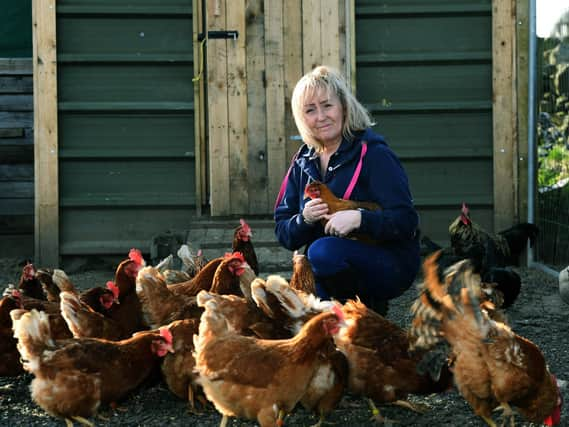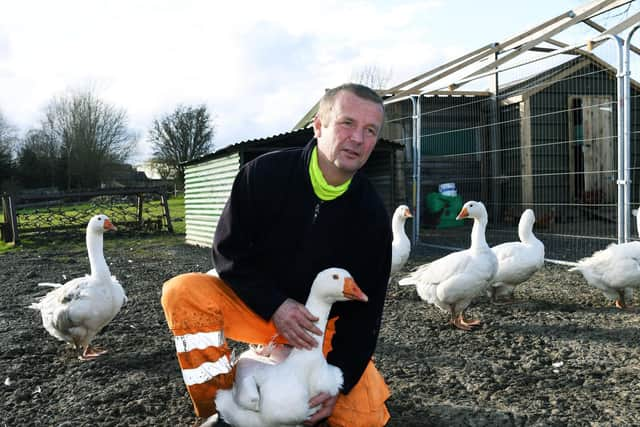Farm of the Week: The former banking and highways workers whose eggs have fed Bramhope during lockdowns


Beef, lamb and eggs are now produced from the 70 acres part-owned and rented in various locations with his partner Kim Goodall, having started with just 20 sheep on rented grassland 20 years ago.
Andrew had worked on farms as a teenager but had followed a career in groundworks and road surfacing, which led to his current position with Leeds City Council as a team leader in the highways department. Andrew said he always knew he would return to farming.
Advertisement
Hide AdAdvertisement
Hide Ad“I started working on farms around Calverley when I was a boy. It was all I ever wanted to do. Farming is a funny thing. Once it’s in your blood it doesn’t leave. I worked for dairy farmers Clifford Sheard of Acacia Farm in Apperley Bridge and Jim Scott of Walm Lane in Yeadon when I was in my teens.


“Jim had 60 cows and also bottled his milk, which went on doorstep delivery. I was earning £55 a week and was paid in pound notes in a brown envelope.”
Andrew came back into farming 17 years later, just after foot and mouth disease restrictions were lifted. He said the move to Bramhope came in 2003.
“A friend and I bought a packet of sheep out of our savings. We grazed them on rented land in Apperley Bridge and it has all built from there. I bought out his share within six months and moved up here on Moorland Road where it is always said to be ‘a top coat colder than anywhere else’ as it can get a bit blustery.”
Advertisement
Hide AdAdvertisement
Hide AdThe sheep remained Andrew’s only livestock for the first four years. Andrew said he gradually built up his numbers and the amount of land rented.
“The plan at the start was to breed for profit from the purebred Texel gimmer lambs. We knew with lambs at foot we should be able to draw a decent figure, but I decided to keep them as breeding ewes and build the flock. I started selling half lambs to friends and family.
“We now have a flock of 25 in-lamb ewes that lamb from late April, which we are slowly moving from Texel cross to Mule cross for a bigger carcase. We move the sheep around land that we rent in a 10-mile radius from the farm. I’d never planned on growing the way we are now, until I bought a couple of cows in 2006.”
Andrew and Kim’s herd has now grown to 15 suckler cows and with around 50 head of cattle on the farm at any one time, it now forms the largest income. Andrew said they plan to increase the herd further.
Advertisement
Hide AdAdvertisement
Hide Ad“I’d like to take our suckler herd to between 20-25 sucklers and have around 65-75 head. We take stock to a minimum of 24 months. We started with two Limousin cross heifers and then a Limousin cross Friesian. I’d always wanted to own a pedigree Aberdeen Angus and bought two from Martin Hare in Tong in 2007.
“Our herd is now made up of crossbreeds including Angus, Limousin, Hereford, Simmental and Blonde d’Aquitaine and we have a Hereford stock bull. Everything here is all natural bulling, we don’t conduct any AI work, and we don’t feed anything but what grows out of the ground.
“Grass in summer, silage and haylage in winter. Any heifer calves that look as though they can do a job for us stay in the herd and 50 per cent of our suckler cows are now our own homebred stock with potentially another three to come into the herd currently.”
Andrew attributes part of their herd’s continued success to their first bull, Dan, a pedigree Charolais.
Advertisement
Hide AdAdvertisement
Hide Ad“He was an absolute diamond as he was such a pleasure to work with. There are at least five of his offspring in our suckler herd today and nine beasts currently on the farm.”
Kim works on the farm every day, having given up her banking career. She said having the right bull is massively important not just for the stock but also her own wellbeing.
“I work with them largely on my own, so I need the bulls to be docile, not temperamental like some can be.”
Kim and Andrew have been a couple for twelve years.
Eggs from Kim’s chickens and geese have become an ever more popular purchase by visitors at the farm gate in the past year since Covid restrictions. Kim said she hadn’t planned on starting with them.
Advertisement
Hide AdAdvertisement
Hide Ad“Someone dumped several cockerels over our wall one night. We weren’t able to catch the cockerels to make them safe and the fox saw off all but one.
“I had a friend who had some Light Sussex and we bought four hens for our remaining cockerel. That was six years ago. We now have around 70 hens, mainly Lohmann Browns.
“Our egg trade from the farm went crazy during lockdown and I kept having to buy more chickens. We buy them at point of lay and they stay with us, as Andrew says ‘til death us do part’.
“We also now have half a dozen egg-laying geese, which we started with after rescuing four. Our gander Frankie is head of security on the farm.”
Advertisement
Hide AdAdvertisement
Hide AdAndrew and Kim now market their produce as Bramhope Beef & Lamb, which has expanded from sales to friends and family and now includes supplying Andrew’s long-time favourite pub The Thornhill Arms, online sales via social media and their website, and their meat being made into pies by Rawdon butchers, JB Wilkinson.
Andrew said local produce is the way forward for their farm and others.
“There’s a big market out there. Why would you want to buy from a supermarket if you can buy something direct from a producer? The key word at one time seemed to be organic, but I think it’s now local.”
Andrew said he and Kim are keen to progress further. “In 12 months we will have expanded again. We are always looking for more land. We will buy another bull. I’ve always wanted to produce and sell raw milk from the farm gate from Jersey cows. I think I’m going back to my roots.”